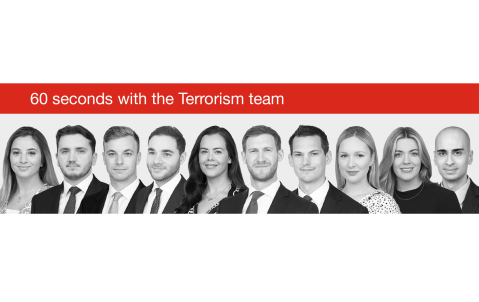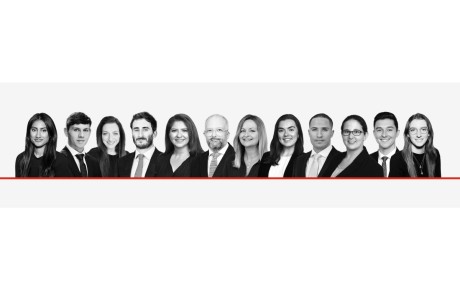
60 seconds with… the Terrorism team
For our latest ‘60 seconds with…' we hear from the Hiscox London Market Terrorism team to understand what drives them, why they enjoy underwriting terrorism risks, and the challenges they face. If you missed our last ‘60 seconds with…’ on the Kidnap and Ransom London team, you can read it here.
"Last year wasn't easy in the political violence space – one of the products under our terrorism cover – but under challenging circumstances the team has continued to provide excellent service and innovative solutions to brokers and clients alike. We remain an incredibly experienced, market leading team and I’m proud of the team’s performance and their dedication to being the best at what they do."
Rich Halstead - Terrorism Line Underwriter
Rich Halstead
What do you predict will be the biggest threats that your clients will face in the next three to five years?
Despite the large industry losses caused by the conflict in Ukraine, the greatest risk is that posed by unrest in the form of strikes, riots, and civil commotion. Challenging economic conditions are putting a strain on living standards around the globe and, in the worst cases, this is making basic survival difficult with foodstuffs soaring in price and people taking to the streets to voice their discontent.
Together with other longstanding issues in many territories such as a polarised political landscape, political corruption, poor governance or high levels of crime and violence the end result is an increasing propensity towards social unrest.
Our market has expanded over the last 10-15 years in terms of geographical reach and coverage which means we can provide solutions to our clients for these threats though it is asking tough questions of our underwriting from an exposure management perspective.
What inspired you to become a terrorism underwriter?
As with most people in our industry I can’t claim to have always dreamed of a career in insurance but having fallen into it by chance, I was quickly drawn to the political violence market. I did a degree in war studies so it was the insurance class most suited to my academic background.
What has been the most pivotal point of your career as an underwriter?
I’ve had two; the first being when I returned to work from a six-month sabbatical in my 20s, which I assumed at the time would be bad for my career. I walked into a situation where most of the senior team were poached to start up a new book at another syndicate. This resulted in me having exposure to deals, opportunities and challenges that I probably wouldn’t have had otherwise and set me on the path to taking over as line underwriter a few years later – the moral of the story for me is always take a sabbatical if you get the chance!
Secondly, I’d say the situation we find ourselves in today with the war in Ukraine and several other major losses providing the catalyst for significant change in our market and the first real hardening – where premiums and capacity increase – since the class was born after 9/11. It’s incredibly hard work but a fascinating experience and obviously a chance to see a different stage of the insurance market cycle.
Jade Warden
What are the most pressing issues in your current role?
The most pressing issue is the changing market due to the global crisis, with not only an ongoing war in Ukraine, but a cost of living crisis fuelling unrest. As underwriters we have a whole new breadth of challenge in underwriting our book. Not only do we need to potentially re-underwrite each risk on its own merits, but we need to ensure our appetite and knowledge is more up to date than ever as the risk landscape continues to evolve at pace.
With team management responsibilities, a pressing issue for me is ensuring that we are handling the volumes of business while maintaining underwriting quality and making sure that the team is coping with the added pressure.
What is the most rewarding part of being a terrorism underwriter?
Crafting solutions and building strong relationships with clients and brokers is the most rewarding part of the role. Knowing you have secured a new contract and that you are providing a great solution for a client's risks and worries is a great feeling. There really is never a dull day; my job has enabled me to learn every day and travel the world.
What does Hiscox offer to clients that other insurers don’t?
Expertise in various insurance sectors and passionate people who really care.
James Short
What is the most interesting part about being in the Hiscox Terrorism team?
No risk is the same. We work in countries across the world and across all industry types from pipelines in Pakistan to chicken farms in Alabama. You never really know what the next risk submission is going to look like.
What does the future of terrorism underwriting look like to you?
Unfortunately, demand will remain for political violence insurance in the medium to long-term. Social unrest – driven by a range of socio-economic and environmental factors – is on the rise in many parts of the world while the needs of complex international businesses are constantly changing. The future of terrorism underwriting will be in meeting the needs of clients as the nature of risk, and the nature of business, evolves.
How has the market changed in the past decade?
The biggest change has been with the providers in the market. On one hand, terrorism insurance is more commoditised than ever and on the other, we are seeing more complex and risk exposed clients than we did 10 years ago.
Charlotte Piller
What has been the highlight of your career so far?
A business trip took me to Kurdistan, Iraq to visit a large client. It was an incredible experience from both a personal and professional perspective as it provided me with a great deal of insight into the risks we get involved in.
Describe your role in three words.
Fast-paced, interactive and sociable. War, Terrorism and Political Violence underwriting takes you to all four corners of the globe and, with over five different products, we have to consider a wide range of risks on a regular basis.
Omar Zeineldine
What is the most challenging part about being a terrorism underwriter?
Striking the balance between commercial requirements whilst ensuring minimal volatility in the exposure written on the book. Hiscox proudly runs one of the largest political violence books in the world and is a recognised Lloyd’s lead of global business. In an ever-growing market, maintaining our position whilst upholding underwriting principles is hugely challenging.
What inspired your move from broking to underwriting?
Whilst broking allowed for a client facing experience, and presented interesting challenges with regards to placement, I always sought the responsibility of providing the capacity myself. Underwriting allows me to fulfil the aspects of insurance I really enjoy; analysing risk, studying political and social situations around the world and book-wide data analysis. Moreover, underwriting political violence has a hugely commercial side through meeting clients and managing broker relationships, so I see many of the skills offered in broking are transferable to underwriting.
How has your masters in International Security & Global Governance helped you further your career as a terrorism underwriter?
Having studied international relations in a post-cold war world, I feel this has stood me in good stead to understand the potential pitfalls that could be on the horizon with regards to where we write exposure, allowing us to make educated assumptions on how to manage the book.
Additionally, one of my favourite aspects of being a senior underwriter is having the opportunity to develop younger members of the team.
Tom Ledson
What attracted you to apply for the Hiscox graduate scheme?
The first thing that stood out about Hiscox is the company’s reputation and stature within the market – everyone I had spoken to before applying had told me what a great a place it is to work. Having interned here and experienced Hiscox myself, it was a no-brainer to try to come back via the graduate scheme, particularly with its rotational aspect, meaning I had the opportunity to work within different areas of the business.
What three words best describe being an underwriter?
Tenacity, commerciality and dynamism.
What advice would you give to someone starting out in the industry?
Be open-minded and flexible about the areas of insurance you work in – most people in the industry ‘fall into’ insurance. I certainly didn’t know that terrorism and political violence insurance existed before I joined the team on the graduate scheme. You are never tied down to one job and gaining a breadth of experience is strongly encouraged. Also, never be afraid to ask questions – no question is a bad question!
Abby Walters
What should someone know about you that isn’t on your CV?
Prior to my career in insurance, I trained as a Speech and Language Therapist at university and then worked in the NHS for five years rehabilitating adults with acquired brain injuries which was an incredibly rewarding and challenging.
What event changed the way that you view terrorism insurance?
It would definitely be the recent situation in Ukraine which has changed the way I view our market. When I first started underwriting this class of business we were in a very soft stage in the market. Ukraine is the largest loss our market has faced and we have had to rapidly adapt our underwriting techniques and learn new skill sets to cope with the challenges of the hardening market. It’s been a steep learning curve, but satisfying to learn lots of new skills around what’s driving rates, re-underwriting the majority of our accounts and tightening terms and conditions.
What is the most fascinating aspect about being a terrorism underwriter at Hiscox?
There are two I find particularly interesting. Firstly, the close link between the coverage we offer and current affairs mean we are constantly able to link what is going on around the world and what we see in the news to the risks we underwrite on a daily basis. Secondly, our market is built and dependent on having strong relationships with our brokers and colleagues which is a key strength of our team.
Freddie Van Den Bergh
What has been the best skill that you have developed since working at Hiscox?
Learning how to manage and keep service levels high when risk submissions are flooding in the whole time given we are a high-volume class.
What inspired your move from being a professional cricket player to being a terrorism underwriter?
I wanted to get into the City once I stopped playing cricket, and always heard great things about insurance and Hiscox in particular. The terrorism team offers a fast-paced environment which really suits me and I love that we look at such a wide variety of risks from all over the world which is great from a learning perspective.
How would you describe the Hiscox London Market Terrorism team in three words?
Tenacious, dynamic and lively.
Charlotte Kadir
How did you get into insurance?
I had work experience at a global broker whilst at school and this provided me with a great insight into how the insurance market operates. I found it interesting to see how brokers and underwriters interact with one another whilst on a tour of Lloyd’s and through speaking to different people within the company. Both of my sisters work within the insurance industry which helped me make the decision to join the market. I also liked the idea of being able to continue my studies whilst working. I was particularly interested in the terrorism sector as it’s a fairly new market which is continually changing, meaning there is always a chance to broaden my knowledge.
What is the most valuable skill to have as an underwriter, and why?
The most valuable skill to have as an underwriter is the ability to analytically review all risks.
What attracted you to join the Hiscox London Market Terrorism team?
We’re one of the biggest within the market, covering a wide range of perils from strikes and terrorism to malicious attack. The team goes beyond insuring risks, offering the expertise services of crisis management consultancy Control Risks, who provide advice on security situations and the capability to respond pre/post incidents.
Elliot Woodhouse
What Hiscox terrorism product interests you the most, and why?
Political violence is our most comprehensive product in terms of the perils it covers, including war and civil war. Due to its complexity, it requires a deep understanding of the risk involved as it is purchased by clients in high risk territories.
How have you found the transition from being a fine art underwriting assistant to becoming a terrorism underwriter?
Joining the team has allowed me to pursue my career goal of becoming an underwriter. Working in terrorism requires an understanding of political situations in different locations and having the ability to work out whether we want to accept the risk and what premium to charge. The line of business relates to my background and interests, having studied politics and economics at university and being keen on current affairs.
What issues are your brokers most worried about currently?
Our brokers are most worried about the challenges of a hard market, the hardest since 9/11. There is reduced capacity across the market, especially at locations where risk aggregations are high, meaning large and complex risks are more of a challenge to place.




